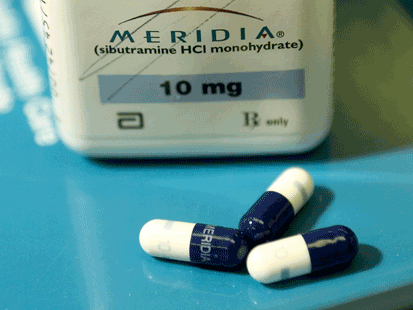October 8, 2010 — Abbott Laboratories has withdrawn the obesity drug sibutramine (Meridia)
from the market in light of clinical trial data pointing to an
increased risk for stroke and myocardial infarction, the US Food and
Drug Administration (FDA) announced today.
The agency asked Abbott Laboratories to pull the drug from the market after it evaluated data from a postmarketing study of the drug's cardiovascular safety. The study, called the Sibutramine Cardiovascular Outcomes Trial (SCOUT), demonstrated a 16% increase in the risk for serious cardiovascular events such as nonfatal heart attack, nonfatal stroke, the need for resuscitation after the heart stopped, and death in a cohort of patients given sibutramine compared with another given a placebo.
In September, an FDA advisory panel reviewed the SCOUT results, with half of the members in favor of withdrawing sibutramine and the other half recommending stricter access to the drug and tougher label warnings.
Following the advisory panel vote, the FDA concluded that the cardiovascular risks posed by sibutramine outweigh the modest weight loss observed with the drug, which the agency had approved in 1997.
At a press conference today, John Jenkins, MD, director of the Office of New Drugs at the FDA's Center for Drug Evaluation and Research, said that roughly 100,000 people in the United States are currently taking sibutramine.
The FDA is advising physicians to stop prescribing sibutramine and for patients to stop taking it and talk to their healthcare provider about alternative weight-loss regimens. The agency does not know of any withdrawal syndrome associated with the drug, according to Dr. Jenkins.
Dr. Jenkins also said he is not aware of any long-term consequences for patients who stop taking the drug. The cardiovascular events observed in SCOUT, he said, probably stem from sibutramine increasing blood pressure and heart rate. These adverse effects disappear once the drug is withdrawn.
In the wake of the sibutramine decision, there are still a limited number of FDA-approved drugs for losing weight, said Mary Parks, MD, director of the agency's Division of Metabolic and Endocrine Drug Products, at today's press conference. Prescription drugs for short-term weight loss include phentermine and diethylpropion. Orlistat is available in both an over-the-counter form (Alli; GlaxoSmithKline) and prescription form (Xenical; Hoffman-La Roche) at a higher dose, Dr. Parks added.
Last May, the FDA revised the label for both versions of orlistat to warn about rare cases of severe liver injury associated with the drug.
Dr. Jenkins suggested Friday that the nation would benefit from more weight-loss drugs.
"We're still very committed to working with (manufacturers) to help them to develop and gain approval of safe and effective drugs to help patients manage weight," Dr. Jenkins said. "Obesity is a serious health problem."
More information about today's announcement is available on the FDA's Web site.
In a related action, the FDA warned consumers today not to use a weight-loss product called Slimming Beauty Bitter Orange Slimming Capsules, sold over the Internet, because they contain sibutramine. The drug is not listed on the product label.
To report adverse events related to sibutramine or Slimming Beauty capsules, contact MedWatch, the FDA's safety information and adverse event reporting program, by telephone at 1-800-FDA-1088, by fax at 1-800-FDA-0178, online at http://www.fda.gov/medwatch, or by mail to MedWatch, FDA, 5600 Fishers Lane, Rockville, Maryland 20852-9787.
大約1年前,有醫學研究報告指出,在北美地區市面上已販售超過10年的諾美婷減肥藥,可能會增加服用者心臟病與中風的危險。不過,亞培一直到現在才宣布下架停售則引發爭議。
今年1月,已經有歐洲國家衛生主管機構禁止諾美婷銷售,理由是醫學研究顯示如果消費者患有心臟病,服用這種減肥藥之後發生心臟病爆發或中風的機率會明顯提高。
美國食品暨藥物管理局(FDA)的科學家指出,FDA要求亞培停止在北美地區繼續販賣諾美婷,理由是消費者吃這種減肥藥的「瘦身效果十分有限」,考量到這種減肥藥具有健康風險,兩者衡量之下,不應讓健康成為犧牲品。
根據統計,去年美國國內開出這種減肥藥處方箋數量約28萬3000份,這個數目大概只有2005年數量的一半。
FDA 統計,服用諾美婷的民眾平均服藥時間為50天,而且80%的服用者是中年婦女。





 留言列表
留言列表
 線上藥物查詢
線上藥物查詢 